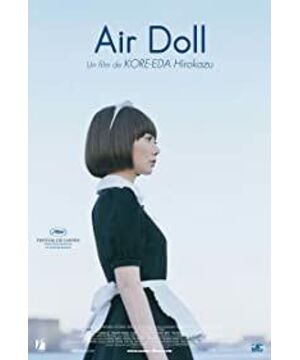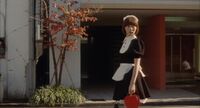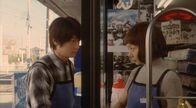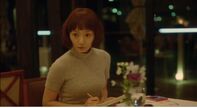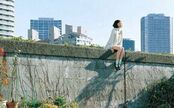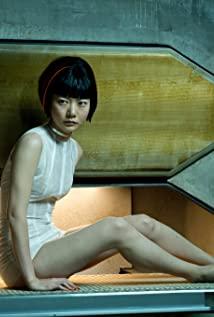In 1993, before he transformed into a film director, Hirokazu Kore-eda, as a TV documentary worker, made a documentary about the film "When Films Reflect the Age: Hou Hsiao-hsien and Yang Dechang". In many interviews, Hirokazu Kore-eda also talked about the influence of the two directors on him, especially the former. The director once said that if it weren’t for him studying Chinese and seeing Hou Hsiao-hsien’s films in Japan, he probably wouldn’t have embarked on the road of filmmaking. In this film, Li Pingbin, Hou Hsiao-hsien's royal photographer, was invited to appear "natural", and it was Li's outstanding camera movement that greatly enhanced the film.
The surprise of Hirokazu Shire is that after watching the film, I saw an interview and found that she has a preference for the fictional theme of comics. In the existing impression, she and another outstanding Japanese female director Naomi Kawase are both "naturalistic", light and shadow. The style of painting is also "realistic". Even the plotless treatment of Hirokazu Koreede's husband's suicide for no reason in "Phantom Light" is like the plot of his brother who disappeared out of thin air while running in Naomi Kokase's "Sara Double Tree". How a realist finds the poetry of the gap between reality and fiction becomes the question I have when watching the film.
Thanks to Li Pingbin's airy camera movement for the extremely beautiful picture, the beauty of the picture and the "dirty and messy" of the failed crowd from the mainstream perspective peeped by the camera in the play form the first layer of gap. Pei Doona's beautiful body as slender as a rib woke up one morning and became the real starting point of the plot. Of course, the Hollywood screenwriting skills, that is, the strong dramatic conflict of characters, will certainly not appear in Hirokazueda, and even a few scenes that should have been hot and hot They were all restrained by Li Pingbin's "camera back" concept used by Hou Hsiao-hsien. In this post-modern ghostly visual world, even if the camera does not "lie", it often has the urge to "hunt for novelty". Even Kim Ki-duk, whom I respect more and more, is also a habitual offender. S von Trier. In my opinion, the camera did not fall into the situation of hunting for beauty and curiosity from the "peeping" perspective of this film, which is also amazing for the "self-control" of the two.
Going back to the story of Bae Doona's life, in the intersection with the lost crowd (with the exception of the creator of the inflatable doll) that the camera later overlooks in the film, the psychological damage to the inflatable doll named "Little Wang" in the film is essentially It is still created by the dislocation of identity, because "Xiaowang" is essentially a replica of a rib rather than the owner of half of the identity attribute in human society. Although it was Hirokazu-eda's original intention, it is still a hidden ailment about the developing population of Japan, the most westernized oriental society. But when I saw in the film that when Xiaowang said that it has a "heart", it might as well say that it has a "soul", that is, "emotion, thought and will" under the generally accepted Kant trichotomy, except for the detachable and clean reproductive system. The nature of organs and the need to inflate the tire is no longer different from that of human beings, so I said at the beginning of the paragraph that the humility and loss of the inflatable doll maker (it is a powerful maker) in the film is actually a bit strange.” "Naturally, the reference to the author's writing is the Bible. In the comic film, the creator sees the life he created and tragically makes him bear self-blame and guilt when he interacts with human beings. In the Bible, the creator uses the cross as the end and guarantee to point the way to man. But back to the film, the author of the inflatable doll is just a plaintive analogy: you are incombustible garbage, and people are combustible garbage. It means the same destination, different paths, and the same direction. This is also in line with Hirokazu Kore-eda's view of people in the interview.
In the film, Hirokazu Kore-eda quotes the poem "Life" by Japanese poet Hiroshi Yoshino:
Life
It may not be able
to
be created by its own power, to successfully complete it, just
like a flower,
even if the pistil and stamen are gathered together, it
is not enough. It
still needs the visit of insects and the breeze to
connect the relationship between the pistil and the stamen
. Completed by the presence of the Other Yet we are unaware of, and never told of, our vital lack of ourselves. It turns out that we are the seeds that were sown. However, sometimes, the relationship that is unforgettable can be maintained. In this way, the world is Cleverly constructed, that's why the horsefly, imprisoned in the light, slowly flies close to the blooming flower I am also, maybe, someone else's horsefly and maybe you too, once was the wind that blew me. When these look for and ask. When the verses of acknowledging the lack of self and expressing emotion about the great creation appear on the screen, they seem to mark the milestone of Hirokazu-eda's ideological division. But the story is not always easy to come to an end, and the paragraphs of Hirokazu Kore-eda's thought history are divided and continued to follow. This is not a passion for watching movies. The breath in the Bible is for people to receive the Holy Spirit. In the film, he breathed a sigh of relief, but "Xiao Wang" had a similar orgasmic reaction to the conception process, and the male protagonist became obsessed with this new way of intercourse. It was Hirokazu Kore-eda who saw it as a parody, so the ending pessimistically allowed one trash to open the window and aim at another trash. He Yong sang that the world is a garbage dump, so why do we have to spend a lot of garbage consuming movies and write garbage movie reviews?
2015.7.9
View more about Air Doll reviews


